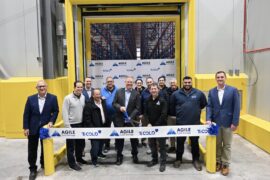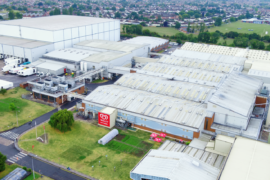Atlanta, Georgia-headquartered Americold Realty Trust has reported that total revenue in the second quarter of 2021 that ended on June 30 climbed 35.7% to $654.7 million, while net operating income increased 21.0% to $155.3 million. There was a net loss of $13.4 million, however, during Q2.
The warehouse segment of world’s largest publicly traded REIT focused on the ownership, operation, acquisition and development of temperature-controlled warehouses posted a revenue increase of 35.3% to $503.7 million and a net operating income gain of 20.2% to $144.4 million during the second quarter. Global Warehouse segment same store sales increased 2.1%, and was flat on a constant currency basis.
“We continued to produce strong growth across our platform, as we benefited from strategic acquisitions completed over the last year,” stated President and CEO Fred Boehler. “We remain confident in the global demand for all types of food in our diverse portfolio. However, the global food supply chain continues to be impacted by the ongoing effects of Covid-19, especially limitations on production due to disruptions and challenges in the labor market. While we anticipate these issues will improve in the coming quarters, it will limit near term performance, which will result in our 2021 results being softer than originally anticipated.”

Boehler continued: “As we look to the future, our food manufacturing clients are working diligently to return to pre-Covid production and inventory levels. We expect a gradual recovery, but based on feedback from our customers, we do not expect to get back to normalized inventory levels until mid 2022. In the meantime, we benefit from the scale and diversity of our portfolio, the effectiveness of the Americold Operating System, and the discipline of our commercial processes.”
Year to Date 2021 Highlights
For the first half of this year, Americold’s total revenue increased 33.4% to $1.29 billion, while net operating income rose 18.5% to $312.5 million. A new loss of $27.6 million has been logged, which amounts to $0.11 per diluted common share.
Year to date Global Warehouse segment revenue has risen 31.3% to $0.99 billion, while net operating income advanced 17.7% to $290.6 million. Same store revenue in the segment increased 0.2%, and decreased 1.9% on a constant currency basis.
Acquisitions and Ground Breaking in US, UK, Ireland, Australia
From an external growth perspective, the company continues to execute on strategic developments and acquisitions.
On May 5, Americold completed the purchase of KMT Brrr! in New Jersey for $71.1 million. The operation consists of two owned facilities totaling 13 million cubic feet, as well as transportation services.
On May 28 an agreement was finalized to acquire Bowman Stores, which operates a single campus in Spalding, England, for £74.1 million. The campus aggregates 10 million cubic feet along with four buildable acres of land to support additional development.
Other activities in Q2 included ground breaking for a dedicated, build-to-suit facility for a large, private consumer packaged goods manufacturer in Dunkirk, New York. This warehouse will provide 25,000 pallet positions with expected completion during the second quarter of 2022 and an estimated total cost of $43 million.
Ground was also broken in Atlanta, Georgia for a highly automated multi-tenant facility. Completion of the project is expected during the second quarter of 2023, and the estimated total cost of $36.5 million.
Elsewhere, ground was broken for a conventional multi-tenant facility Dublin, Ireland, with expected completion during the third quarter of 2022 and an estimated total cost of €26.5 million.
Subsequent to the end of Q2, Americold acquired ColdCo Logistics in St. Louis, Missouri, and entered into purchase agreements to acquire Newark Facility Management in Newark, New Jersey, and Lago Cold Stores in Brisbane, Australia, for a combined total of $488 million.
Globally, Americold owns and operates 246 temperature-controlled warehouses, with over 1.4 billion cubic feet of refrigerated storage space in North and South America, Europe, and the Asia-Pacific region. It network of facilities serves as an integral component of the supply chain connecting food producers, processors, distributors and retailers to consumers.






